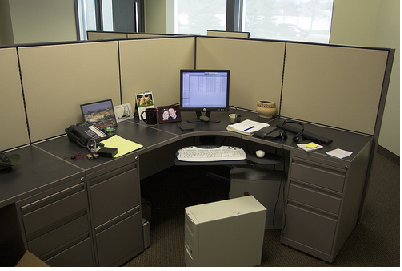Unless you’re skillful, lucky or incredibly unlucky, you’ll probably spend the rest of your working life sitting at a computer, doing the same process repeatedly and not breaking anything. Fortunately as a member of the post-Y generation, you’ll already be well-honed in at least two of those things.
Troubleshooting And Repairs
Even in a company that has an in-house technical department, it’s always a good sign that if something’s not going right with a piece of hardware or software you’re using, you know how to put it right yourself without having to call out for help. If that means fixing a jammed mouse wheel, or finding a way to work around a flawed database system, then go for it.
A lot of the time, this amounts to having an all-around decent level of comfort and intuition with computers and devices, and knowing what plugs into where. Just make sure you don’t confuse this with overconfidence and guesswork. Even if you didn’t cause the problem, you can get a reputation for having made it much, much worse.

Sending Emails & Maintaining Your Calendar
Before I started working in offices, I thought this was a skill that most people under the age of seventy could muster. Apparently, I was wrong. Please, don’t use comic sans for any message ever. And don’t reply to a mass email by clicking ‘reply all’.
Most email programs have calendar functionality as well. And since you’re expected to keep your dates in line digitally, it means you won’t have an excuse for missing deadlines or meetings. So it’s important to know the ins and outs of programs, like Outlook, to keep them running smoothly for you.
Shortcuts & Computer Organizing
One thing you’ll notice about modern offices is how surprisingly un-modern some of them can be. Technology develops faster than most companies can afford to keep up with, so unless you’re at a startup or a tech-heavy firm, you’ll probably be working with old computers. After all, upgrading things is expensive, and most of the long-term workers get used to the old systems anyway. You might even see Windows 98 rearing its archaic head if your company is stagnant and lumbering enough.
As such, the computers will most likely be atrophied and updated randomly (if at all), and finding any files will mean delving into a labyrinth of jumbled shared folders and drives. Having the handful of folders you’ll actually need, organized into shortcuts is important if you want to cut down on the dead space in your day as you trawl for what you need.
Adaptability
You’ll find as you go between jobs and offices that however well your Microsoft Office skills serve you, a decent bulk (if not a full majority) of your working life will be spent using company-specific software. Sometimes it’s for something incidental, like timekeeping or ordering supplies, but a lot of the time it’s an integral part of the job.
It’s rare that you’ll find a company that doesn’t use unique software for something important, so having the skills and confidence to work with new tools and systems will stand you in good stead.
Are you an office veteran with wisdom to offer, or a newbie with fresh ideas you’d like to let the world know? Why not share a comment?
About Author: Ed Hitchman is a blogger and serial office worker. He recommends Applied Workplace.

